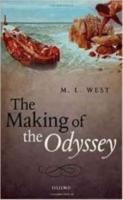
Oxford (2104) h/b 315pp £70 (ISBN 9780198718369)
An Honorary Fellow of All Souls, Martin West was appointed to the Order of Merit in 2013, a high and richly deserved honour for perhaps the most brilliant and productive Greek scholar of his generation. The Homeric epics have always been a favourite stamping ground of his, and here with his usual formidable confidence, acuity and mastery of detail he marshals all the evidence at his disposal to conclude that the Odyssey (whose poet he calls ‘Q’) was not composed by the same poet as the Iliad, though Q certainly knew the Iliad; that it was composed somewhere in the Western Mediterranean (perhaps Euboea or Attica) around 630 BC as a rival to the Iliad (but surely someone would have know the poet’s name at that late date?); and that it is possible to discern various earlier versions of the poem on which Q constructed his own supreme effort.
For example, W. sees signs of an earlier version where Odysseus wandered for three years, not ten; enjoyed only a brief stay on a Phaeacia in which Arete was Alcinous’ sister, not wife; consulted Teiresias not in the underworld but in Thesprotia; Penelope was wooed by twelve suitors, not 108; and much more of this sort.
After this detailed analysis of the poem’s making, W. ends with the longest chapter of all in which he simply tells the story of the Odyssey, explaining its twists and turns with reference to his own conception of Q’s handling of his material. It is perhaps surprising that, though W. has little time for modern scholarship and leans heavily on German analytical scholarship of the 19th C, he has no time for Germanic theories of multiple authorship. W. freely acknowledges the oddities they identify, but concludes they are down to Q’s ‘flawed genius’.
For that is what W. considers Q to be. Q can be slapdash, inconsistent and often insensitive to the point of obscurity in his use of epic language (especially when re-using passages from the Iliad). At the same time, W. finds him fluent, inventive and imaginative, a gifted landscape painter (Calypso’s island, Odysseus encounter with Nausicaa) with a penchant for the rustic (Cyclops’ cave, Eumaeus’ piggery) and keen interest in life in a palace (Eurycleia putting Telemachus to bed, Circe’s maids preparing Odysseus’ bath), naturalistic (good on dogs) and with an ear for lively, persuasive dialogue.
And the ending of the Odyssey? Was its telos at 23.296, as e.g. Aristarchus said? Yes, says W., but only in the sense that telos does not mean ‘conclusion’ but ‘end-goal’. However, W. admits that he imagines it was also the story’s conclusion at some stage, though argues that conclusion should come at 299, where everyone goes to bed. However, W. sees Q himself ‘spoiling’ this ending with another of his expansions designed to bring in Odysseus’ father Laertes and deal with the anger of the families whose sons Odysseus had slaughtered in the palace.
This is a marvellous book by a superb scholar at the height of his powers. It rests on the assumption that the problems in the Odyssey arise not from interpolation but from the faults of the author. Whether it will wholly lay to rest the ghost of Denys Page, whose utterly persuasive and unmatchably witty The Homeric Odyssey (1955) introduced many of us to the joys of Homeric multiple authorship, remains to be seen.
Peter Jones
